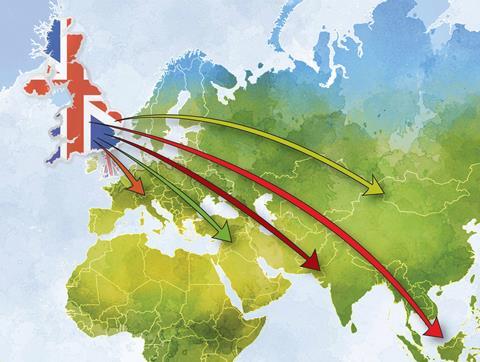
Exports might just be the good news story many in the fresh produce industry have been waiting for, thanks to a growing interest in British products and a favourable export currency.
Trade experts at last week’s Food Matters Live reported that there is a “palpable” change in attitude among British firms since June’s Brexit vote, from one of shock, to one of pragmatism and a desire to grow exports.
But following up random enquiries and bolting exports onto someone’s day job is not the way to capitalise on this burgeoning trend. Instead, suppliers should target one or two markets, identify emerging trends, and harness the power of digital and social marketing to make inroads into overseas markets.
Chair of the Food and Drink Exporters Association, Nicola Thomas, explains: “Don’t respond to general enquiries here and there – target emerging markets and aim for longer-term relationships and a balanced portfolio, inside and out of the EU.”
Smaller businesses, such as those in the fresh produce sector, would do better to target niche markets, Thomas believes, as larger commodity export markets will be dominated by high-volume multinationals. “Markets are polarising between commoditisation and niches. Smaller businesses are better suited to niche markets as they are more agile. For example, the corporate gifting market is growing enormously in places like Belgium and the Netherlands. Similarly, there is growth in speciality stores, and premium snacking in the hotel and catering sector. Look at markets like Germany where they have a much bigger variety of retailers – the sector is much more fragmented meaning it’s easier to access.”
Jack Hamilton, marketing director at Northern Irish grower Mash Direct, recommends attending global food trade fairs, such as Anuga or Sial, to assess what’s out there. And he believes British exporters should sell the ‘story’ of the business, as well as the product, with retailers in the Middle East particularly receptive to maintaining family brand visuals. “We built a consumer following in the UAE using targeted Facebook advertising to reach shoppers who were already fans of [retailer] Spinneys, as it was cheaper than billboard or media advertising.”
Financing a new exports venture might be the biggest concern for first-time exporters, but head of Defra’s Great British Food Unit, Tim Render, says the UK Export Finance is available to help, and had its funding capacity doubled under last week’s Autumn Statement. Render is clear about the benefits of exporting. “The quality of British produce is recognised worldwide. The Chinese market will pay double or even treble the value of a product, because they know the quality is there,” he says.
And while Brexit may have put the brakes on any investment plans, especially overseas, Thomas believes now is actually the best time to act. “Once you have appointed an overseas distributor, give them the highest level of service and NPD, so when trading conditions do change post-Brexit, they won’t want to leave you. We had the single most successful trade mission ever in Madrid last month, in terms of deals done on the day. Businesses are no longer prepared to sit around and see what happens – they want to continue to grow,” she says.



